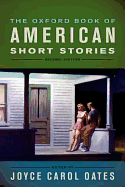
| Publisher: | Oxford University Press | |
| Genre: | Literary Collections, General | |
| ISBN: | 9780199744398 | |
| Pub Date: | August 2012 | |
| Price: | $21.95 |
| Fiction |
by Joyce Carol Oates
Compiling a survey of American short stories is a balancing act between making selections based on well-reasoned personal preference and attempting to be inclusive of various schools of writing or regional or ethnic backgrounds (among other possible criteria). Happily The Oxford Book of American Short Stories editor Joyce Carol Oates, a prolific writer of novels and short stories, is a hybrid of fan, writer and academic and well-suited to the task. "Familiar names, unfamiliar titles" is her inspiration, and she's provided a roster of authors that is both inclusive and rooted in the desire to showcase some of the best stories Americans have to offer.
With some of her selections, the "unfamiliar titles" edict is not so easy--how do you choose a lesser-known excellent Edgar Allan Poe story?--and sometimes she bypasses the rare gemstones for the diamonds: Ernest Hemingway's "Hills Like White Elephants," for example, or Shirley Jackson's "The Lottery." The late 20th and early 21st centuries are well-represented, including contributions from Donald Barthelme, Philip Roth, Stephen King, Ha Jin, Lorrie Moore and David Foster Wallace. Oates provides introductions to each story with a brief biography, thoughts on why the writer's style is notable and details about the particular story was chosen for inclusion. While this book is most likely to wind up in the hands of students, there's a lot here to recommend to readers in general. --Matthew Tiffany, counselor, writer for Condalmo

| Publisher: | Bloomsbury | |
| Genre: | General, Fiction, Historical | |
| ISBN: | 9781608199372 | |
| Pub Date: | September 2012 | |
| Price: | $25 |
| Fiction |
by Lance Weller
An old Civil War veteran's courageous struggle to rescue a faithful companion changes the lives of everyone he meets in Lance Weller's debut novel, Wilderness.
In 1864, at the Battle of the Wilderness Abel Truman lost the use of one arm, and the brutality and loss he witnessed hurt enough to send him fleeing to the Pacific Northwest, where he hoped to forget the war as well as the tragic loss of his wife and child. Thirty-five years later, living alone in a remote shack, Abel has achieved a measure of peace in his old age--until a pair of dangerous thugs beat him nearly to death and steal his beloved dog, Buster, for a dog-fighting circuit. Despite his wounds, Abel follows his attackers into the Olympic Mountains, unwilling to leave Buster to such a fate. Over the course of his travels, Abel relives his wartime experiences with his fallen comrades, saves a life and inadvertently drags an innocent couple into his conflict.
Years of research into Civil War history show in Weller's confident use of period detail, from his characters' speech patterns to the atrocities of the battlefield. The intensely intimate narrative personalizes 19th-century America's darkest moments as Abel struggles with his conscience and prejudice as a young man and his guilt and trauma in his twilight years. Tender and resonant, Weller's debut is not an epic saga of war, but a skillful exploration of the interconnectedness of humanity and the endurance of compassion. --Jaclyn Fulwood, blogger, Infinite Reads
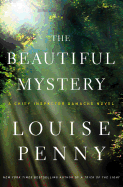
| Publisher: | Minotaur | |
| Genre: | General, Fiction, Mystery & Detective, Traditional British | |
| ISBN: | 9780312655464 | |
| Pub Date: | August 2012 | |
| Price: | $25.99 |
| Mystery & Thriller |
by Louise Penny
In The Beautiful Mystery, the eighth book in Canadian author Louise Penny's Inspector Gamache series, Chief Inspector Armand Gamache and his protégé Jean-Guy Beauvoir investigate the brutal murder of a prior within the isolated and mysterious monastery of Saint-Gilbert-Entre-les-Loups. Despite taking vows of silence, the Gilbertine monks have recently earned renown (and buckets of money) by releasing a low-quality recording of their astounding choir performing Gregorian chants, and the monastery is now divided between those who wish to court their new fame and those determined to remain faithful to the purity of their monastic vows. With the unexpected arrival of Superintendent Francoeur, Gamache's superior and acknowledged if undeclared enemy, the Inspector must attempt to unravel the murder while being undermined by one of his own.
Within the first few chapters, it becomes obvious why Penny has garnered consistent critical and popular acclaim for her series. She writes an elaborate and intricate mystery, weaving together various plots in a thematic tapestry that mirrors the complex chants she writes of so beautifully. With a wonderfully atmospheric setting and painfully realistic characterization, The Beautiful Mystery is an excellent story on its own, but is also firmly grounded in its series and would certainly be enriched by familiarity with the previous Gamache novels. It is sure to delight current fans and will no doubt gain Louise Penny many new ones as well. --Judie Evans, librarian
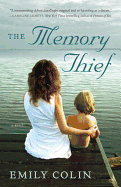
| Publisher: | Ballantine | |
| Genre: | Fiction, Romance, Ghost, Sagas, Contemporary | |
| ISBN: | 9780345530394 | |
| Pub Date: | August 2012 | |
| Price: | $15 |
| Romance |
by Emily Colin
Several chapters into Emily Colin's The Memory Thief, as you're reveling in the pleasure of an intriguing romance with interesting, genuine characters and a touch of the supernatural, you'll flip the book over to find out about her other titles. Surprisingly, though, this is Colin's first novel. She's just that good.
The story centers on Madeline and her recently deceased, mountain-climbing husband, Aiden. Aiden's spirit is caught somewhere in limbo; many miles away, a young man named Nicholas wakes up from a coma, retaining all of Aiden's memories. Due to the influence of Aiden's spirit, Nick thinks he's in love with Madeline, whom he's never met before. To complicate matters, Aiden's best friend J.C. finally confesses his long-buried feelings for Madeline as well. The grieving widow is going through quite a lot, but she can't complain that a good man is hard to find. Things get complicated as everyone collides, but despite a touch of the whimsical, The Memory Thief is incredibly down-to-earth and insanely enjoyable to read.
Colin has a gift for storytelling that will keep you hanging on every word. She combines fascinating details with quirky little plot points. Even when Colin uses flashbacks, it doesn't take away from the momentum of the story. And there are a number of steamy scenes that keep the action moving right along to its surprising and satisfying conclusion. It will be a delight to see what Colin conjures up for her next novel. --Natalie Papailiou, author of blog MILF: Mother I'd Like to Friend
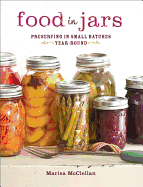
| Publisher: | Running Press | |
| Genre: | Canning & Preserving, Methods, Cooking | |
| ISBN: | 9780762441433 | |
| Pub Date: | May 2012 | |
| Price: | $23 |
| Food & Wine |
by Marisa McClellan
Marisa McClellan writes about canning, pickling and preserving at her "Food in Jars" blog, and readers have responded well to her no-nonsense, friendly tone and remarkable ability to make the canning process seem both easy and accessible--regardless of the size of the kitchen or the level of culinary expertise. Now, much of McClellan's wisdom has been gathered together in a neat little cookbook--also called Food in Jars--featuring more than 100 recipes, along with a collection of mouthwatering, full-color photographs and helpful tips.
McClellan has a self-professed love for jam, but she clearly knows how to use spices creatively--and she's also not afraid to offer more savory recipes for those who want to go beyond the sweeter canning options. Most importantly, perhaps, she realizes that many of us would prefer to can in small batches due to time and space restraints.
Though some of McClellan's fresh fruit jam recipes would be best tried in the spring and summer (such as cantaloupe jam with vanilla), readers will be surprised by the diversity of food that can be canned year round. Come autumn, consider the recipes for apple-pumpkin butter, mulled cider jelly or spiced applesauce. Fall vegetables can also be used to make pickled Brussels sprouts and gingery pickled beets--and who wouldn't like a jar of cranberry orange granola for the holidays? --Roni K. Devlin, owner of Literary Life Bookstore
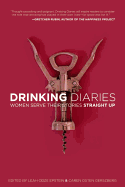
| Publisher: | Seal Press | |
| Genre: | Social Science, Essays, Self-Help, Alcoholism, Substance Abuse & Addictions | |
| ISBN: | 9781580054119 | |
| Pub Date: | August 2012 | |
| Price: | $16 |
| Essays & Criticism |
by Leah Odze Epstein, Caren Osten Gerszberg
Born out of a popular blog of the same name, Drinking Diaries is a multifarious collection of essays by women about their relationships with alcohol. Leah Odze Epstein and Caren Osten Gerszberg have created a diverse, intimate and nonjudgmental anthology that is by turns funny, illuminating and often heartbreakingly honest.
The essays are organized into themed sections--including "Girlhood," "Culture" and "Revelations"--from an admirable crop of writers who range from active alcoholics to stern teetotalers. Elissa Schappell measures her marriage in drinks; Asra Nomani finds balance between her Muslim upbringing and adult independence; Ann Hood writes a loving tribute to her father and their bond over beer. Others navigate parenting and drinking, share stories of recovery (and relapse) and rhapsodize about the freedom and release of lowered inhibition.
But Drinking Diaries does not idealize its subject. Nearly every contributor mentions the profound impact of a parent's drinking on their own lives; many essays are devoted to it. The sobering specter of shame and addiction lurks throughout. "We secretly love to smash things we create, including ourselves," Jane Friedman writes. "I admit to having used alcohol with this intention--to give myself permission to delve into the darkness and come out with the dawn holding a fresh view."
Drinking Diaries may give you a satisfying sense of solidarity rather than an entirely "fresh view," but it certainly will provide a reflection on the potent duality of alcohol's seductive and destructive powers. --Hannah Calkins, blogger at Unpunished Vice
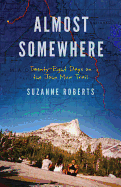
| Publisher: | Bison Books | |
| Genre: | Sports & Recreation, Biography & Autobiography, Walking, Personal Memoirs, Hiking | |
| ISBN: | 9780803240124 | |
| Pub Date: | September 2012 | |
| Price: | $19.95 |
| Starred | Nature & Environment |
by Suzanne Roberts
In 1993, Suzanne Roberts was a college graduate lacking a firm plan for the future when she agreed to hike the John Muir Trail with two other women. Almost Somewhere is a travelogue of that month-long hike, but it's also a woman's foray into the male-dominated worlds of hiking and nature writing and a contemplation of the cattiness and competition that limits women's attempts to connect with one another. Roberts is not gentle to herself or her companions as she describes their flaws and failures to support one another; she is frank about the bounds of their friendship. But she has a triumphant story to tell, because despite swollen joints, bugs, infighting and the doubts of fellow trail users, these three women hiked the John Muir Trail in its entirety and lived to tell about it.
Roberts writes plainly about gender issues, as the women ("we had gone through puberty a long time ago and, really, we were no longer girls") consult a guidebook written by a man filled with language of "conquering" or "assaulting" mountains. She seeks not only meaningful relationships with other women, but also a feminine understanding of nature, having read nature writing only by men (Muir, Thoreau, Edward Abbey) up until this point. Her understanding of her experience is clear-headed and self-aware in retrospect, and she is considerate of her companions even in her criticism. Almost Somewhere is a contribution to the growing body of women's nature writing, and a worthwhile, entertaining and occasionally funny story of the California wilderness. --Julia Jenkins, librarian and blogger at Pages of Julia

| Publisher: | Little, Brown | |
| Genre: | Health & Fitness, Nutrition | |
| ISBN: | 9780316196840 | |
| Pub Date: | August 2012 | |
| Price: | $10.99 |
| Health & Medicine |
by William Sears, James M. Sears
Imagine a pill that could alleviate "atherosclerosis, thrombosis, arrhythmia, heart attacks, immune-inflammatory disorders, asthma, arthritis, psychiatric disorders, depression, suicide, oppositional behavior, unproductive workplace behaviors, cancer proliferation, and length of stay in hospitals." Pediatric doctor William Sears (The Baby Book) believes he has found this miracle medicine. After surviving colon cancer in 1997, Sears made "a project of his problem" and soon discovered that cultures that eat seafood suffer remarkably less often from cancer, among other illnesses, than those who follow a standard American diet. The key, he believes, is the Omega-3 fatty acids found in fish oil.
In The Omega-3 Effect, Sears hopes to "reach the most readers with the best science in the simplest way," using clear, concrete metaphors to accomplish this goal. Sears (writing with his son, Dr. James Sears) begins by explaining what everyone needs to know about Omega-3s--what they are, why they are important and why fish oil is the best of all available sources. He proceeds to outline their healing effects thoroughly and convincingly, then guides consumers toward the safest, most sustainable sources of fish for children and adults, adding dosage recommendations based on individual goals or existing health conditions.
Throughout, Sears anticipates frequently asked questions (What about vegetarians? What if I don't like fish? How can I avoid the "fishy" aftertaste of fish oil supplements?). Overall, The Omega-3 Effect is a well-documented, accessible guide that will make even hardened skeptics take notice. --Kristen Galles from Book Club Classics
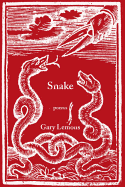
| Publisher: | Red Hen Press | |
| Genre: | General, American, Subjects & Themes, Nature, Poetry | |
| ISBN: | 9781597092357 | |
| Pub Date: | September 2012 | |
| Price: | $19.95 |
| Starred | Poetry |
by Gary Lemons
Gary Lemons' Snake is a brave and beautiful book--a trippy, visionary ride to the end of the world, where all is in flames except for Snake, who remains as a repository of all Earth's memories and shared consciousness.
Lemons' poetry is disarmingly simple, like a folk or blues lyric: "Time keeps on passin--til it's not / recognizable as time but feels more like / Dreamin in a tide pool beside a warmin / Sea where blood sacks couple in the waves." But there are hidden depths and meanderings, musicality where you'd least expect it. For a reptile, Snake is a surprisingly compassionate bearer of memory. He longs to be loved and remembered as were others who went before him: "Snake knows the dead be happier cause they got / One another for company and if he could / Only die, which he can't, he never be alone again."
While Snake is a long, rambling, apocalyptic dream that plays out in the head of a slithering everyman, it is also a tear-filled lament for wildlife and traditions we are on the verge of losing now--and a meditation on the push and pull of shared and specific consciousness as Snake fights to maintain his identity while almost literally carrying the weight of the world.
Snake is a wonderful fable, a trickster tale, a vision of a world set to fire by a vengeful mother earth, and some fine, chiseled poetry, direct and wisdom-filled. --Donald Powell, freelance writer
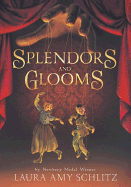
| Publisher: | Candlewick | |
| Genre: | Horror & Ghost Stories, General, Fantasy & Magic, Juvenile Fiction, Toys, Dolls, & Puppets, Historical | |
| ISBN: | 9780763653804 | |
| Pub Date: | August 2012 | |
| Price: | $17.99 |
| Starred | Children's & Young Adult |
by Laura Amy Schlitz
Laura Amy Schlitz turns from the airy Medieval town of her Newbery Medal–winning Good Masters, Sweet Ladies to a hauntingly claustrophobic tale set in an 1860 London enveloped in thick fog and a dilapidated estate in England's lake district.
The author entwines the fates of a 70-year-old witch named Cassandra; a girl named Clara Wintermute, who's the only surviving child of a rich physician and his wife; and the wizard Grisini, who doubles as a gifted puppeteer. Grisini keeps his two orphaned assistants, Lizzie Rose and Parsefall, on a string as tight as those of his extraordinary marionettes. Clara catches sight of Grisini's puppet show in Hyde Park and decides that this should be the entertainment at her 12th birthday party. Schlitz weaves together the individual chapters, which move smoothly among the third-person viewpoints of each character, into an edge-of-your-seat tale. Young Lizzie Rose is the first to suspect Grisini after Clara Wintermute disappears the night of her birthday party, and the police come to search Grisini's flat. But Parsefall, who's spent more years under Grisini's influence, knows the evils of which the man is capable and tells Lizzie Rose to keep mum--though he, too, thinks Grisini may have engineered Clara's disappearance.
As the author unravels the mystery, she explores the many levels on which the characters themselves serve as puppets. Schlitz proves herself a master storyteller as she skillfully maneuvers the strings of this gothic tale right up to the astonishing climax. --Jennifer M. Brown, children's editor, Shelf Awareness
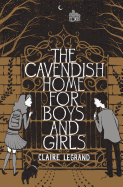
| Publisher: | Simon & Schuster | |
| Genre: | Friendship, General, Fairy Tales & Folklore, Social Issues, Juvenile Fiction, Action & Adventure | |
| ISBN: | 9781442442917 | |
| Pub Date: | August 2012 | |
| Price: | $16.99 |
| Children's & Young Adult |
by Claire Legrand, illust. by Sarah Watts
Claire Legrand sets her terrific debut in a society where being a bit odd can land you in an orphanage with missing children.
Twelve-year-old Victoria Wright's only friend is Lawrence Prewitt. Lawrence's hair began going gray when he was nine, making him look like a skunk; he cannot tuck his shirt in properly; and he loves playing his "wretched piano," which Victoria thinks is a waste of time. She takes on Lawrence as "her personal project" and a gift to the Belleville community--until he goes missing. Strange things begin happening in Belleville, including an infestation of indeterminable black bugs and the disappearance of a class clown and her rival's twin. Some people forget about them completely, while others behave as if nothing's happening. With the help of a brave neighbor, Victoria tracks the disappearances to the Cavendish Home for Boys and Girls. She must hurry to rescue them, however, because in Cavendish, nobody stays past their 13th birthday, and Lawrence's is just two weeks away.
Miss Cavendish is a villain reminiscent of Miss Trunchbull from Matilda, with her sense of duty to improve unruly children and her mechanisms for punishing them. Legrand's third-person narrative adopts a proper, know-it-all attitude for Victoria's story, which makes for a hilarious read-aloud. Watching the heroine grow throughout the novel may well inspire readers to accept others, despite their oddities; it's a theme sounded in an entertaining fashion. Readers will anticipate Claire Legrand's next flight of fancy. --Adam Silvera, reviewer and former bookseller